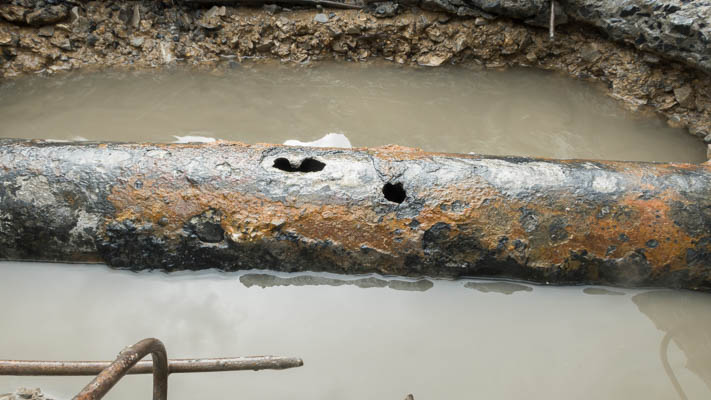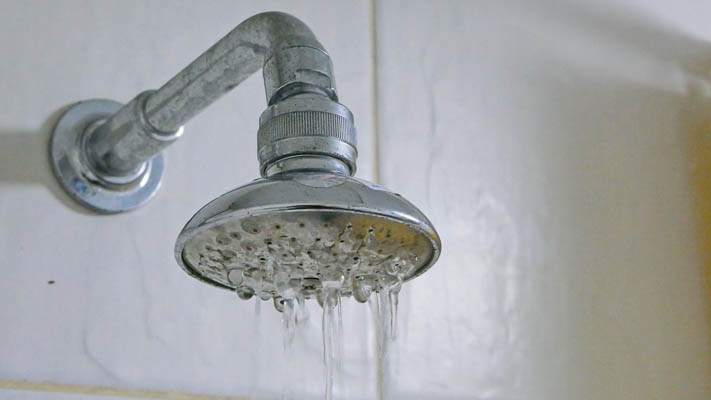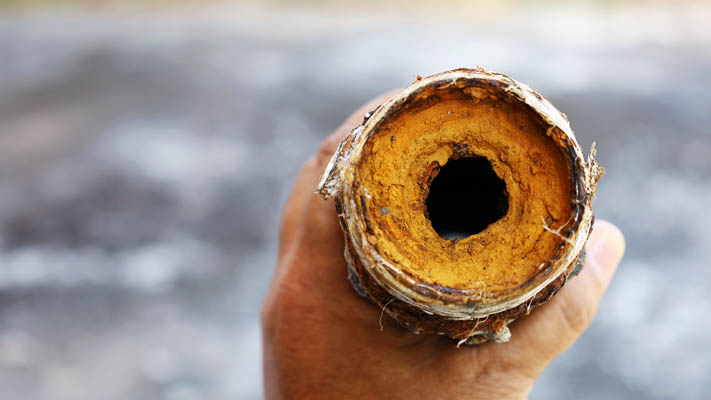How Long Do Galvanized Pipes Last?
Originally, galvanized pipes were expected to have a lifespan of 50 to 70 years or more. However, in real-world use, many galvanized pipes began corroding in less than 25 years, and most after about 40 years of service.

Galvanized steel pipes were commonly used from the early 1920s through the 1960s. After the 1960s, copper and various types of plastic piping (such as PEX, CPVC, and now outdated polybutylene) became the preferred materials over galvanized steel.
This means that any galvanized plumbing still in a home is almost certainly at least 60 years old and at or beyond its intended service life.
Get your free estimate today
With over 75,000 repipes completed, we've perfected our One-Stop Repipe™ for your home.
What Is Galvanized Steel Plumbing?
Galvanization is the process of coating steel (or iron) pipes with a protective layer of zinc, which protects the steel from rust and corrosion.
Rust occurs when iron (a key element of steel) reacts with water and oxygen. As long as the zinc protective coating remains intact, the underlying steel will not rust.

Zinc also reacts with oxygen to form zinc oxide. Unlike iron oxidation, zinc oxidation occurs at a much slower rate. However, eventually all the zinc coating will fully oxidize and wear away, exposing the underlying steel pipe to oxygen (either from water internally or air externally).
We offer suggestions to help you identify galvanized plumbing in another article, in case you're unsure whether your home has galvanized pipes.
Key Factors Affecting How Long Galvanized Pipes Last
Several factors influence the lifespan of galvanized steel pipes. Understanding these can help you identify potential issues and know when to consider replacement:
- Zinc quality and thickness: The thicker the zinc coating, the longer it will last before fully oxidizing and wearing away. There are different methods for applying the zinc coating; some result in a lower percentage of zinc in the coating, while others make it more likely that zinc can flake off during use or chip during installation.
- Steel quality and thickness: Once the steel in a plumbing system starts being exposed to oxygen, its chemical composition and thickness will influence how quickly it rusts and corrodes.
- Installation quality and methods: If an installation causes nicks or abrasions to the protective zinc coating, the steel around those weakened areas will start rusting much sooner. This is particularly common at fittings and connections.
- Water pH level: Both the zinc protective coating and the underlying steel oxidize faster in water that is not pH neutral. Hard water tends to be more alkaline (high pH), while soft water tends to be more acidic (low pH). Hard water is rich in minerals such as calcium and magnesium, which over time cause scale buildup. This can compound pipe blockage and flow restriction problems from internal rust accumulation.
- Hot vs. cold water lines: Hot water holds more oxygen in suspension. The higher oxygen levels, combined with higher temperatures, cause the galvanized zinc layer and steel to corrode much faster in hot water lines compared to cold water lines.
- Pipes in damp areas: If galvanized pipes are located in damp areas, such as underneath slab foundations, the outer zinc coating can degrade much faster. As the zinc coating deteriorates, the steel pipes will rust and corrode due to moisture, leading to possible breaks and leaks.
Once the steel in galvanized piping starts to rust, multiple problems can arise and worsen over time: drinking water may become discolored and taste rusty; internal rust and scale buildup will restrict flow, causing low water pressure at outlets; and thinning pipe walls can lead to leaks.
You can read more about these issues in our article on the problems caused by galvanized pipes.
What to Do If You Have Outdated Galvanized Pipes
If your home still has galvanized pipes, the only long-term solution is a whole-home repipe. Replacing all your outdated pipes at once ensures consistent water quality, improved water pressure, and eliminates the risk of sudden leaks or pipe failure.
At Repipe Specialists, we make the whole-home repipe process straightforward and hassle-free. Our experienced crews can typically complete a repipe in a single day, minimizing disruption to your daily routine.
Through our One-Stop Repipe™ process, we handle everything, from permits and inspections to wall patching, so you don't have to worry about a thing. Plus, our lifetime warranty on all repipes gives you peace of mind for years to come.
Ready to upgrade your plumbing? Schedule a free in-home consultation with Repipe Specialists and let us provide you with a fixed-price quote tailored to your home's needs.
Get a Quote to Replace Your Galvanized Pipes
Here at Repipe Specialists, since 1991 we've fully replaced galvanized plumbing in thousands of homes using high-quality materials such as Uponor PEX-A tubing and American-made Type L copper piping. We consistently receive positive feedback from customers about their whole-home repipe experiences. We often exceed their expectations in areas such as:
- Speed: Our repipe crews typically complete a repipe in a day, returning on another day for wall patching.
- Convenience: Through our One-Stop Repipe™ process, we handle everything from permits, to wall patching, to inspections.
- Cleanliness: Our crews are trained to protect your home while working (we cover all surfaces with protective sheeting), and to clean up fully at the end of each day.
- Peace of Mind: Repipe Specialists is a fully licensed plumber in every state we operate in, and we back all of our repipes with a lifetime warranty.
- Financing programs: To help take the sting out of unplanned repipe expenses, we offer several financing programs.
- Price: As a specialist that performs hundreds of repipes a week, we can deliver high-quality repipes at a lower cost vs generalist plumbers. We have an article that covers repipe cost factors in detail. Our quotes typically range from $4,500 to $15,000 depending on the size and complexity of your project.
Schedule a free in-home consult, and one of our local repipe consultants will explain all your repipe options and provide you with a written, fixed-price quote.

